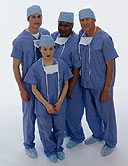U.S. Turns Spotlight on Medicine's Most Puzzling Cases
Undiagnosed Diseases Program seeks to advance knowledge of mysterious conditions.
|
E-mail this article
Subscribe to news
Printer friendly version
|

(SOURCE: U.S. National Institutes of Health, news release, May 19, 2008)
MONDAY, May 19 (HealthDay News) -- A new research program designed to help patients with mysterious health conditions that can't be diagnosed was announced Monday by the U.S. National Institutes of Health.
The Undiagnosed Diseases Program will study the most puzzling medical cases referred to the NIH Clinical Center by doctors across the United States. The goals are to improve disease management for individual patients and to advance general medical knowledge of these conditions.
The program will utilize existing facilities and staff at the NIH Clinical Center, the National Human Genome Research Institute, and the NIH Office of Rare Diseases.
"A small number of patients suffer from symptoms that do not correspond to known conditions, making their care and treatment extraordinarily difficult. However, the history of biomedical research has taught us that careful study of baffling cases can provide new insights into the mechanisms of disease -- both rare and common," NIH Director Dr. Elias A. Zerhouni said in a prepared statement.
Each patient enrolled in the program will be evaluated by more than 25 senior attending physicians at the NIH Clinical Center, the nation's clinical research hospital. The physicians' specialties include endocrinology, immunology, oncology, dermatology, dentistry, cardiology and genetics.
"We have developed a stringent referral process to ensure this program deals with those cases that have truly confounded medical experts. We will be very selective when it comes to patient eligibility. Our focus is strictly on conditions that have not been diagnosed," said program director Dr. William A. Gahl, who is clinical director at the National Human Genome Research Institute.
To be considered for the program, patients must be referred by a physician and provide all medical records and diagnostic tests requested by the NIH. The estimated 100 patients a year who meet the program's criteria will undergo additional evaluation (which may take up to a week) at the NIH Clinical Center.
In organizing the program, the NIH has contacted patient advocacy groups that provide information and support for people struggling with mysterious conditions.
"We hope to build upon our strong working relationships with many patient advocacy groups. These organizations provide a crucial link in our nation's efforts to improve health through biomedical research," Stephen Groft, director of the NIH Office of Rare Diseases, said in a prepared statement.
"We hope that this new partnership of NIH researchers, advocacy groups and patients will give hope for many Americans who now face troubling medical symptoms with no clear diagnosis," Groft said.
More information
Here's where you can find the Undiagnosed Diseases Program.
Copyright © 2008 ScoutNews, LLC. All rights reserved. 
HealthDayNews articles are derived from various sources and do not reflect federal policy. healthfinder.gov does not endorse opinions, products, or services that may appear in news stories. For more information on health topics in the news, visit the healthfinder.gov health library.